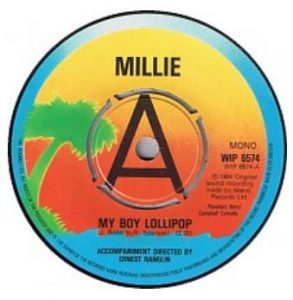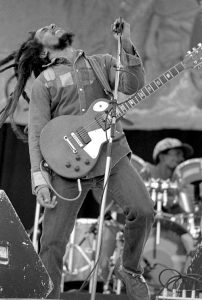
Island Records was formed by Chris Blackwell who was born in London, but grew up in Jamaica. In 1958 after trying various jobs and using money from his parents, he decided to record Lance Hayward, a young, blind jazz pianist who was playing at the Half Moon Hotel in Montego Bay. The record was released in 1959, and this was the beginning of what would later become Island Records. The following year Blackwell had a hit with Laurel Aitken’s ‘Boogie In My Bones’. Using the money from the sales he set up a small office in Kingston. In 1962 Blackwell moved to London and began selling records to the West Indian communities in London, Birmingham, and Manchester from the back of his Mini-Cooper.
Blackwell took the name of Island Records from Alec Waugh’s novel ‘Island in the Sun’. Island Records Ltd began in May 1962 with four partners who invested a total of £4,000: Chris Blackwell, Graham Goodall, an Australian music engineer living in Jamaica, the Chinese-Jamaican record producer Leslie Kong and his brother.
From March 1963 to 1967 Island Records had their office at 108 Cambridge Road, (since demolished as part of the South Kilburn redevelopment plan).
Originally a barber’s shop run by the Gopthal family, when accountant Lee Gopthal bought the house, he rented it out. Chris Blackwell converted the premises into offices managed by David Betteridge, who was later made a director of Island. Initially the records were pressed by British Homophone and then at the Phillips factory in Croydon. In 1962, the basement store at No.108 had been a recording studio set up by Sonny Roberts of Planetone Records. Blackwell introduced additional labels such as Black Swan, Jump Up, Aladdin, Surprise, Sue Records and Trojan which was run by Lee Gopthal.
Rob Bell describes his time at Island from 1965 to 1972 in a series of articles. See www.trojanrecords.com
He said that Island were releasing about half a dozen records a week. The new release sheets were printed by Mr Reed who had a small print shop a few doors up Cambridge Road. Rob said he and others used to eat at Peg’s Café over the road and drink at The Shakespeare pub next to the office. In 1968 when business picked up with the popularity of reggae, together with the compulsory purchase for the South Kilburn redevelopment, Island moved to the much larger Music House at 12 Neasden Lane.
In 1963 Blackwell decided to bring the fourteen year old Millie Small to London. Looking for a suitable song for her to record, he found a copy of American singer Barbie Gaye’s ‘My Boy Lollipop’ which he had bought five years earlier in New York. Recorded at Olympic Studios with a ska arrangement, the record was leased to the Phillips’ Fontana label and in 1964 it sold six million copies worldwide. It reached Number 2 in the UK and the US and became the first international Jamaican hit. Marianne heard Millie sing the song at one of the regular Saturday morning music sessions at the Kilburn State, held in their dance hall with an entrance in Willesden Lane.
Other successful records followed with Jimmy Cliff and the Birmingham band, the Spencer Davis Group who had several hits leased to Fontana such as, ‘Keep On Running’ (1965) and ‘Gimme Some Lovin’. Building on these hits, Island moved to new offices at 155 Oxford Street. In 1970 they moved again to Notting Hill where they had established their own studio in a former church at 8 -10 Basing Street. From here they expanded massively, with artists such as Bob Marley, Cat Stevens, Fairport Convention, Free, Traffic, Jethro Tull, Grace Jones and U2.


In 1989 Blackwell sold his stake in Island and eventually resigned in 1997. His mother Blanche was Ian Fleming’s longtime lover and Blackwell now owns the writer’s house, Goldeneye, in Jamaica. He bought it from Bob Marley. For a beautifully illustrated book see, ‘The Story of Island Records’, edited by Suzette Newman and Chris Salewicz (2010).
<
